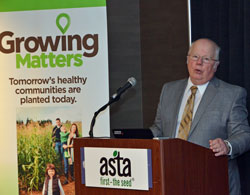 Grower needs drive the Bayer CropScience soybean business according to Diego Angelo, director of US soybean operations, who was at last week’s CSS 2014 and Seed Expo to provide an update.
Grower needs drive the Bayer CropScience soybean business according to Diego Angelo, director of US soybean operations, who was at last week’s CSS 2014 and Seed Expo to provide an update.
“Innovation is in our blood and it’s driven by our passion to help growers be productive and profitable long term,” says Angelo. Right now what growers need most to be profitable is weed control options to fight herbicide resistant weeds. “Bayer had a vision a few years ago that this was going to happen and developed a technology called Liberty Link.” said Angelo, adding that they have seen steady growth in adoption of the technology since it was introduced in 2008. “Our expectation that 1 out of 10 acres sees a Liberty Link soybean in 2016.”
This year, Bayer introduced Credenz, their first ever soybean seed brand. “We need to take a more active role in bringing our technologies to the market and Credenz is our commitment to this technology,” said Angelo. “With Credenz we’ll be offering more choice than any other national brand.” Credenz offers wide range of varieties and traits including LibertyLink, as well as glyphosate-tolerant traits, in 27 high-performing varieties developed for Maturity Groups 2-7.
Learn more about Bayer’s soybean commitment here: [wpaudio url=”http://www.zimmcomm.biz/asta/asta-css-14-bayer-angelo.mp3″ text=”Diego Angelo at CSS 2014 Bayer CropScience press conference”]










